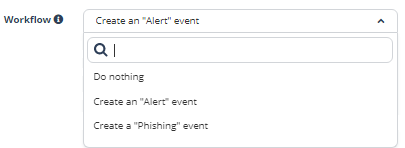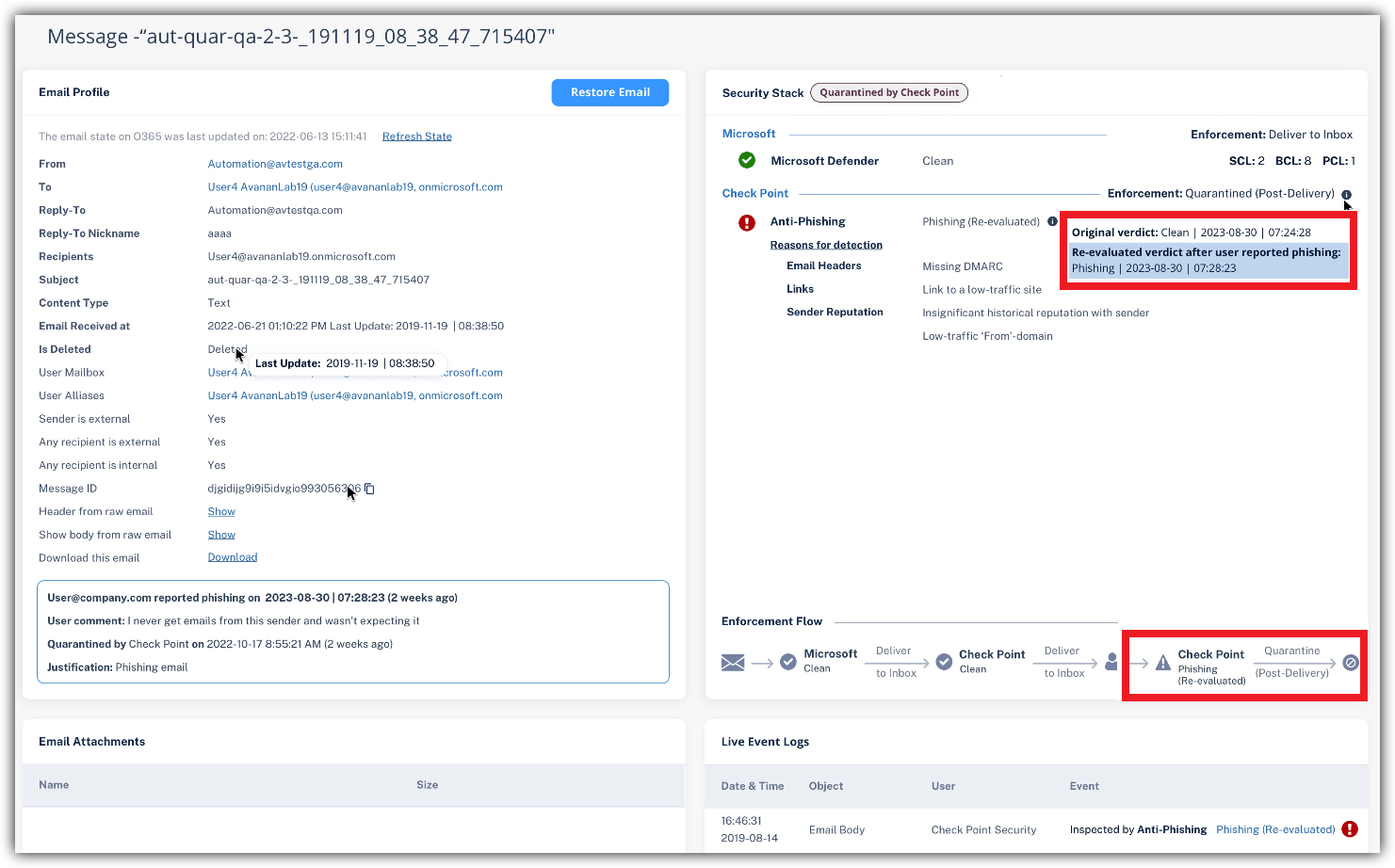Automatic Ingestion of End User Reports
Harmony Email & Collaboration automatically ingests end user phishing reports without requiring organizations to change existing phishing reporting methods.
-
If your organization uses Microsoft's Report Message Add-In, Harmony Email & Collaboration ingests all phishing reports automatically without any additional configuration. See Microsoft Report Message Add-in.
-
If your organization uses a dedicated mailbox where end users forward phishing emails to it, configure Harmony Email & Collaboration to scan such mailboxes. See Dedicated Phishing Reporting Mailboxes.
-
If your organization uses a third party solution with a phishing report button to report phishing emails, configure the solution to send reported emails to a dedicated folder and follow the steps in the Dedicated Phishing Reporting Mailboxes.
|
|
Note - If you have any queries about these configurations, contact Check Point Support. |
Reviewing User Reported Phishing Emails
Email users are key in fighting against phishing. Users can help detect missed attacks, let the security administrators remediate the detected attacks, and adjust the policies to prevent similar attacks in the future.
Harmony Email & Collaboration automatically ingests these reports, alerts administrators about them, and presents them in a dedicated dashboard. This allows administrators to investigate and take necessary actions.
Benefits
-
Present potentially missed attacks in the Harmony Email & Collaboration Administrator Portal.
-
Integrated solution for the security admins to investigate and take actions.
-
Simple, powerful way to increase end-users involvement and interact with them.
Phishing Reports Dashboard
The Phishing Reports dashboard shows the suspected phishing emails from the end users. Whenever a user marks an email as suspected phishing, a new entry is created in the dashboard. This allows the administrator to review and take the relevant actions.
To see the user reported phishing emails, navigate to User Interaction > Phishing Reports.

Acting on Phishing Reports
Administrators can perform one of these actions on phishing reports:
-
Decline - The report will be declined as the reported email does not seem to be malicious. The email remains in the user's mailbox.
-
Quarantine - The report will be approved and the email will be sent to quarantine.
-
Block-list/Allow-list rule - The administrator will choose to create an exception. See Anti-Phishing Exceptions.

|
|
Notes:
|
Notifying End Users about Approving/Declining their Reports
Administrators can choose to notify end users whenever their phishing reports are approved or declined. To enable these notifications:
-
Go to Security Settings > User Interaction > Phishing Reports.
-
In the Reviewing phishing reports section, select the Notify users when their reports are approved/declined checkbox.
-
To change the notification message, click the
 icon next to the checkbox and make the required changes.
icon next to the checkbox and make the required changes. -
Click Save And Apply.
|
|
Note - This will also enable end user notifications for rejected quarantine restore requests. See Managing Restore Requests. |
To configure the notification subject and body:
-
Go to Security Settings > SaaS Applications.
-
To configure the templates for Office 365 Mail, click Configure for Office 365 Mail.
-
To configure the templates for Gmail, click Configure for Gmail.
-
Scroll-down to Advanced and edit these templates:
-
Phishing report decline:
-
Report Phishing decline subject
-
Report Phishing decline body
-
-
Phishing report approve:
-
Report Phishing approve subject
-
Report Phishing approve body
-
-
Events for User Reported Phishing
When a user reports a phishing email, the administrators can determine the event type to be generated by the Harmony Email & Collaboration.
The available options are:
-
Create an "Alert" event
-
Create a "Phishing" event
-
Do nothing
To configure event type for the Phishing Reports emails:
-
Go to Security Settings > User Interaction > Phishing Reports.
-
In the User-Reported Phishing Emails section, in Workflow, select the event type to be generated.
-
Click Save and Apply.
Automatic Ingestion of End User Reports
Dedicated Phishing Reporting Mailboxes
Some organizations provide one or more dedicated mailboxes to end-users to forward phishing emails to (for example, phishing_reports@mycompany.com). You can configure Harmony Email & Collaboration to scan such mailboxes, add every email forwarded to them to the Phishing Reports dashboard and create a user-reported phishing event.
To add dedicated mailboxes to the Phishing Reports dashboard:
-
Go to Security Settings > User Interaction > Phishing Reports.
-
Select the Dedicated phishing reporting mailboxes checkbox.
-
Enter the required mailbox email address.

Note - To add multiple mailboxes, enter the mailbox addresses separated by a comma.
-
Click Save and Apply.
|
|
Notes
|
Microsoft Report Message Add-in
Microsoft offers a built-in Mark as Phishing option in Outlook. When a user clicks this option, Microsoft gets notified of the missed suspected phishing email and sends a reports to report-phishing-checkpoint@<your domain>.
Harmony Email & Collaboration integrates with the native Report Message add-in for Microsoft 365. When a user reports an email as phishing, Harmony Email & Collaboration immediately shows the email in the Phishing Reports dashboard and creates a user-reported phishing event.
Enabling Report Message Add-in in Outlook
By default, in Outlook, the ability to report an email as phishing is enabled.
Office 365 administrators can add the Report Message add-in to their users’ desktop clients if it is not already enabled. To enable the Report Message add-in, refer to Microsoft documentation.
Reporting Phishing Email from Outlook - End-User Experience
Web Client
In the web client, open the email and select Mark as phishing.
Desktop Client
In the desktop client, go to Home tab, click Junk and select Report as Phishing.
Check Point Report Phishing Button
Using the Report Phishing button is optional. Customers can continue reporting phishing emails using their existing methods, and those reports will be automatically ingested by the system.
Reporting Phishing Emails through Outlook Add-In
If an administrator enables the Report Phishing checkbox in the Outlook Add-In Configuration, the system adds a Report Phishing button to Outlook. It allows users to report suspicious emails directly from their inbox using the Report Phishing button.
Reporting Flow
When the Report Phishing button is clicked, the add-in performs the following actions:
-
Re-analyzes the reported email in real time using Harmony’s AI-based security engine.
-
The add-in displays a verdict within seconds:
-
Clean
-
Inconclusive
-
Phishing
-
-
It also displays the reasons behind the verdict, providing transparency into the analysis.
|
|
Note - All phishing reports are handled according to the Reviewing Phishing Events settings configured in the Harmony Email & Collaboration Administrator Portal. |
This functionality streamlines user reporting and enables faster and more accurate threat detection without requiring security expertise from end users.
Reporting Phishing Email through Outlook Add-In - End-User Experience
If an administrator has enabled the report phishing option in the Outlook Add-In, the Outlook application displays the add-in name (as configured by the administrator), allowing users to report phishing emails directly.
To report a phishing email from Outlook:
-
Access the Outlook application.
-
Select the suspected phishing email.
-
Open the add-in and report the email as phishing.
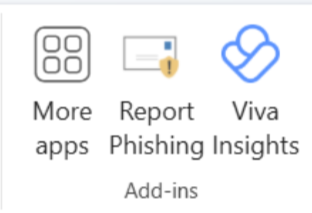
After submitting the report, user will receive a confirmation email indicating that a support request has been created.
Automatic Handling of User Reported Phishing Emails
With Harmony Email & Collaboration, you can automate the handling of user reported phishing email reports, significantly reducing administrator's workload.
Every time a user submits a phishing report, Harmony Email & Collaboration re-evaluates the email and gives a re-evaluated verdict (clean, phishing, or inconclusive).
|
|
Note - When a user reports a phishing email, the reported email is moved to the Deleted folder in the user's mailbox. If the phishing report is later declined, the email remains in the Deleted folder. |
For each re-evaluated verdict, administrators can configure a workflow. To do that:
-
Go to Security Settings > User Interaction > Phishing Reports.
-
Expand Reviewing phishing reports and from the list, select one of these:
-
Manual - Every report is manually reviewed by Administrator.
-
Clean: Send for admin review
-
Inconclusive: Send for admin review
-
Phishing: Send for admin review
-
-
Semi-automatic - Automated actions for some updated verdicts and manual review for others.
-
Clean: Decline report. Email remains in mailbox
-
Inconclusive: Send for admin review
-
Phishing: Approve report. Quarantine the email
-
-
Automatic - Automatic recommendation is performed.
-
Clean: Decline report. Email remains in mailbox
-
Inconclusive: Approve report. Quarantine the email
-
Phishing: Approve report. Quarantine the email
-
-
-
Expand Workflows and notifications.
-
Select one of these from the list:
Re-evaluated Verdict
Available Workflows
Re-evaluated as: Clean -
Send for admin review
-
Decline report. Email remains in mailbox
Re-evaluated as: Inconclusive -
Send for admin review
-
Decline report. Email remains in mailbox
-
Approve report. Quarantine the email
Re-evaluated as: Phishing -
Send for admin review
-
Approve report. Quarantine the email
-
-
Select whom to notify:
-
Notify Admin - The administrator gets a notification when a report is sent for their review.
-
Notify User
-
When report is sent for review - The end user gets a notification when the report is sent for review.
-
When report is approved - The end user gets a notification when the report Is approved.
-
When report is declined - The end user gets a notification when the report is declined.

Note - The availability of these options depends on the workflow selected.
-
-
-
To customize an email notification (subject and body), click
 next to the specific notification, make the necessary changes, and then click Save.
next to the specific notification, make the necessary changes, and then click Save. -
Click Save and Apply.
Re-evaluated Verdict of User Reported Phishing Emails- Administrator Experience
Once the Harmony Email & Collaboration re-evaluates the user reported phishing email, you can find the re-evaluated verdict under Security Stack.
Reporting a Phishing Email in Google Gmail
Google provides a built-in Report Phishing option in Gmail. When a user clicks this option, the suspicious email is forwarded to Google for analysis. This helps enhance Google’s detection mechanisms and protects other users from similar threats.
Harmony Email & Collaboration integrates with Gmail’s native Report Phishing functionality. When a user reports an email as phishing using this option, Harmony Email & Collaboration immediately displays the email in the Phishing Reports dashboard and generates a user-reported phishing event.
Configuring Report Phishing in Google Gmail
By default, the Report Phishing option is available in Gmail's web interface. However, to ensure visibility and consistent usage across the organization, Harmony Email & Collaboration administrators must verify that the option is properly configured so the Harmony Email & Collaboration Administrator portal receives these reports.
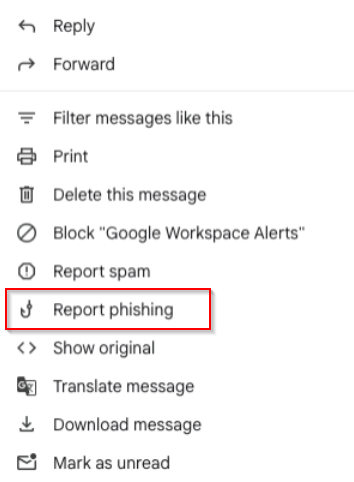
To send phishing reports from Google Gmail to Harmony Email & Collaboration Administrator Portal:
-
Access the Google Admin Console with a Super Admin account.
-
Go to Gmail settings.
-
From the Admin Console home page on the left navigation panel, click Rules.
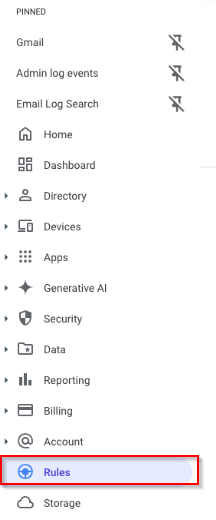
-
In the Rules page that appears, go to User-reported phishing rule and click on it.
-
In the rules details page that appears, go to Actions section and click the edit icon.

-
In the Alerting section, select these checkboxes:
-
Send email notifications
-
All super administrators
-
-
Click Add Email Recipients and enter the email address where you want phishing reports to be sent.

Note - Harmony Email & Collaboration recommends using a dedicated mailbox specifically for phishing reports to ensure proper tracking and efficient response management.


